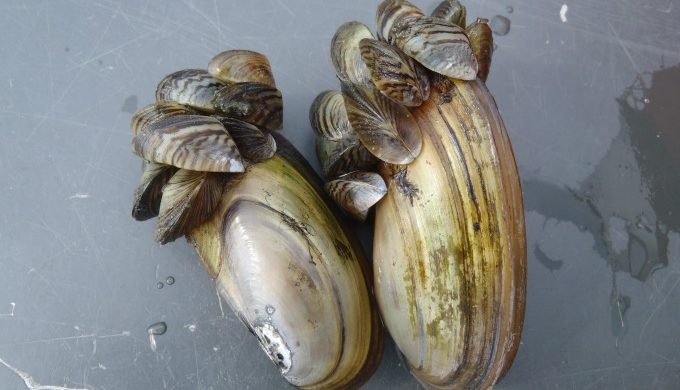It’s official: As of this summer, Canyon Lake and Lake Austin have both tested positive for the invasive zebra mussels. According to Texas Parks and Wildlife, the rapidly reproducing zebra mussels, originally from Eurasia, can have serious economic, environmental and recreational impacts on Texas reservoirs and rivers. Zebra mussels can cover shoreline rocks and litter beaches with treacherously sharp shells, clog public-water intakes, and damage boats and motors left in infested waters.
Zebra mussels can attach to any hard surface, such as the outside of a native mussel’s shell. These native mussels are slowly smothered by the colony of invasive zebra mussels covering the opening of their shells. Since zebra mussels were first found in Texas in 2009, ten lakes in four river basins are now classified as infested, meaning they have an established, reproducing population
Typically Transferred via Boat
Photo: Flickr/Government of Alberta
The invasive pest was discovered in Canyon Lake in June and, most recently in Lake Austin in August. The most common way that these mussels are transferred is via boat. With both Canyon Lake and Lake Austin’s popularity as a boating destination for Texans around the state, combined with their deep water and suitable habitat, made them vulnerable to the spread of zebra mussels.
Photo: Flickr/J.N. Stuart
“Unfortunately, I think this is a textbook scenario of a zebra mussel infestation that is the result of a contaminated boat being launched in the lake,” said Brian Van Zee, Inland Fisheries regional director.
“It really hits home how important it is for boaters to take ownership of the problem and to take the appropriate steps before moving a boat with zebra mussels attached as well as to clean, drain and dry their boats every time they leave a lake. We know that Texans love their lakes and rivers and by taking these three simple steps they do a lot of good toward helping prevent further spread of invasive species in our state.”
The problem with zebra mussels isn’t contained to just the affected lakes. “It’s very unfortunate, not only for the reservoir but also for downstream resources, (in the case of Canyon Lake) including the Guadalupe River and the reservoirs downstream from Canyon Dam,” said Van Zee.
It’s Against the Law to Knowingly (or Unknowingly) Transport Mussels
Photo: Flickr/Wisconsin Dept. of Natural Resources
In Texas, it is unlawful to possess or transport zebra mussels, dead or alive. Boaters are required to drain all water from their boat and on-board receptacles before leaving or approaching a body of fresh water in order to prevent the transfer of zebra mussels that might be inside.
Zebra mussel larvae are microscopic and both adults and larvae can survive for days in or on boats transported from a lake. The requirement to drain applies to all types and sizes of boats whether powered or not: personal watercraft, sailboats, kayaks/canoes or any other vessel used on public waters.






